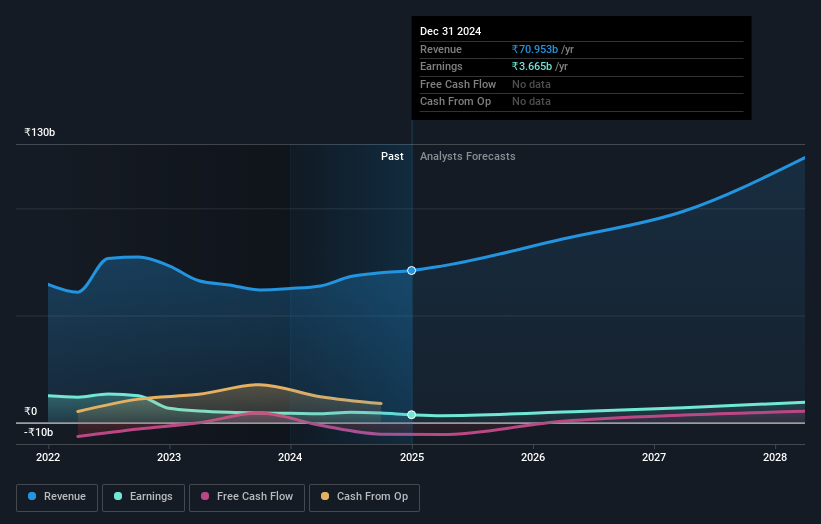Retail investors who hold 31% of Aarti Industries Limited (NSE:AARTIIND) gained 7.8%, insiders profited as well

Key Insights
- The considerable ownership by retail investors in Aarti Industries indicates that they collectively have a greater say in management and business strategy
- The top 21 shareholders own 50% of the company
- Insiders own 28% of Aarti Industries
A look at the shareholders of Aarti Industries Limited (NSE:AARTIIND) can tell us which group is most powerful. We can see that retail investors own the lion's share in the company with 31% ownership. That is, the group stands to benefit the most if the stock rises (or lose the most if there is a downturn).
Retail investors gained the most after market cap touched ₹139b last week, while insiders who own 28% also benefitted.
Let's delve deeper into each type of owner of Aarti Industries, beginning with the chart below.
Check out our latest analysis for Aarti Industries

What Does The Institutional Ownership Tell Us About Aarti Industries?
Institutions typically measure themselves against a benchmark when reporting to their own investors, so they often become more enthusiastic about a stock once it's included in a major index. We would expect most companies to have some institutions on the register, especially if they are growing.
Aarti Industries already has institutions on the share registry. Indeed, they own a respectable stake in the company. This implies the analysts working for those institutions have looked at the stock and they like it. But just like anyone else, they could be wrong. When multiple institutions own a stock, there's always a risk that they are in a 'crowded trade'. When such a trade goes wrong, multiple parties may compete to sell stock fast. This risk is higher in a company without a history of growth. You can see Aarti Industries' historic earnings and revenue below, but keep in mind there's always more to the story.

Aarti Industries is not owned by hedge funds. Our data shows that Life Insurance Corporation of India, Asset Management Arm is the largest shareholder with 6.8% of shares outstanding. Meanwhile, the second and third largest shareholders, hold 4.1% and 3.1%, of the shares outstanding, respectively.
A closer look at our ownership figures suggests that the top 21 shareholders have a combined ownership of 50% implying that no single shareholder has a majority.
Researching institutional ownership is a good way to gauge and filter a stock's expected performance. The same can be achieved by studying analyst sentiments. There are plenty of analysts covering the stock, so it might be worth seeing what they are forecasting, too.
Insider Ownership Of Aarti Industries
The definition of company insiders can be subjective and does vary between jurisdictions. Our data reflects individual insiders, capturing board members at the very least. Management ultimately answers to the board. However, it is not uncommon for managers to be executive board members, especially if they are a founder or the CEO.
Insider ownership is positive when it signals leadership are thinking like the true owners of the company. However, high insider ownership can also give immense power to a small group within the company. This can be negative in some circumstances.
It seems insiders own a significant proportion of Aarti Industries Limited. Insiders own ₹38b worth of shares in the ₹139b company. That's quite meaningful. It is good to see this level of investment. You can check here to see if those insiders have been buying recently.
General Public Ownership
The general public, who are usually individual investors, hold a 31% stake in Aarti Industries. While this size of ownership may not be enough to sway a policy decision in their favour, they can still make a collective impact on company policies.
Private Company Ownership
It seems that Private Companies own 16%, of the Aarti Industries stock. It might be worth looking deeper into this. If related parties, such as insiders, have an interest in one of these private companies, that should be disclosed in the annual report. Private companies may also have a strategic interest in the company.
Next Steps:
While it is well worth considering the different groups that own a company, there are other factors that are even more important. For example, we've discovered 1 warning sign for Aarti Industries that you should be aware of before investing here.
Ultimately the future is most important. You can access this free report on analyst forecasts for the company.
NB: Figures in this article are calculated using data from the last twelve months, which refer to the 12-month period ending on the last date of the month the financial statement is dated. This may not be consistent with full year annual report figures.
New: Manage All Your Stock Portfolios in One Place
We've created the ultimate portfolio companion for stock investors, and it's free.
• Connect an unlimited number of Portfolios and see your total in one currency
• Be alerted to new Warning Signs or Risks via email or mobile
• Track the Fair Value of your stocks
Have feedback on this article? Concerned about the content? Get in touch with us directly. Alternatively, email editorial-team (at) simplywallst.com.
This article by Simply Wall St is general in nature. We provide commentary based on historical data and analyst forecasts only using an unbiased methodology and our articles are not intended to be financial advice. It does not constitute a recommendation to buy or sell any stock, and does not take account of your objectives, or your financial situation. We aim to bring you long-term focused analysis driven by fundamental data. Note that our analysis may not factor in the latest price-sensitive company announcements or qualitative material. Simply Wall St has no position in any stocks mentioned.
About NSEI:AARTIIND
Aarti Industries
Engages in the manufacture and sale of specialty chemicals in India.
Reasonable growth potential with mediocre balance sheet.
Market Insights
Community Narratives



